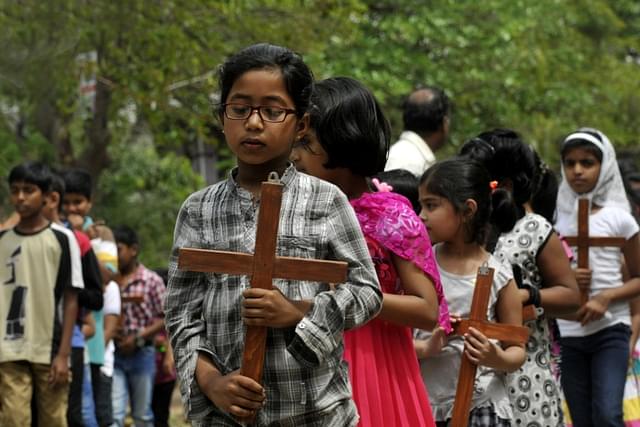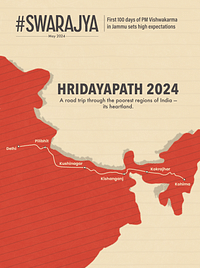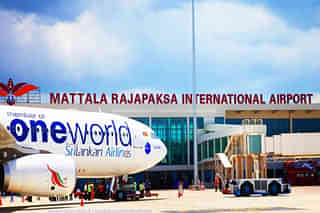Ideas
Can UN Declaration On The Rights Of Indigenous Peoples Halt Evangelism?
R Jagannathan
Sep 18, 2018, 11:37 AM | Updated 11:37 AM IST
Save & read from anywhere!
Bookmark stories for easy access on any device or the Swarajya app.

Some time earlier this year, National Geographic magazine offered an unusual mea culpa for its decades of racism and misportrayal of ancient and aboriginal African and Australian cultures. It asked a University of Virginia professor, John Edwin Mason, to examine archived issues of the magazine from the early 20th century for such biases, and he came up with a devastating verdict. To quote the magazine, “What Mason found, in short, was that until the 1970s National Geographic all but ignored people of colour who lived in the United States, rarely acknowledging them beyond laborers or domestic workers. Meanwhile, it pictured ‘natives’ elsewhere as exotics, famously and frequently unclothed, happy hunters, noble savages - every type of cliché. Unlike magazines such as Life, Mason said, National Geographic did little to push its readers beyond the stereotypes ingrained in white American culture.”
Noting the apology, an African film-maker, Ng'endo Mukii, commented that it was too late for an apology, for “National Geographic’s Photography Erased People… For over a century, photographers reinforced the idea that black and brown people are sub-human. This has fed into science, politics, and the global distribution of wealth.”
She added: “National Geographic and similar publications formed the embers that have stoked white saviour complexes across the globe. Along with Christianity and colonialism, which enforced an almost complete erasure of culture, it has formed the mythology of our depravity, our cannibalism, our exoticism, and our disjointed self-image.”
A hundred years from now, if two predatory religious faiths, Christianity and Islam, manage to do the same to another ancient civilisation and culture, Hinduism and its Indic siblings, through massive conversions, a similar apology may well be offered, but it won’t make any difference to the defeated.
To stop this from happening, a small group of Indic activists has launched a petition that seeks to collect half a million signatories to back its claim that Conversion is Colonialism: It Destroys Cohesion, Community, Culture. If it gets this kind of backing, the group, gathered under the banner of The Mauritius Declaration, will seek a ban on conversions globally and move the International Court of Human Rights for justice, among other things.
But, wait. Isn’t freedom of religion a fundamental right under the Indian Constitution, and also globally?
Well, not always. The UN Declaration of the Right of Indigenous Peoples (DRIPS) suggests that religious conversions are essentially unwarranted as they constitute an assault on diversity. Among other things, the UN Declaration, which was adopted by 177 countries in September 2007, affirms that…
“…all doctrines, policies and practices based on or advocating superiority of peoples or individuals on the basis of national origin or racial, religious, ethnic or cultural differences are racist, scientifically false, legally invalid, morally condemnable and socially unjust.”
It recognised “…the urgent need to respect and promote the inherent rights of indigenous peoples which derive from their political, economic and social structures and from their cultures, spiritual traditions, histories and philosophies, especially their rights to their lands, territories and resources”, and expressed concern that “…indigenous peoples have suffered from historic injustices as a result of, inter alia, their colonisation and dispossession of their lands, territories and resources, thus preventing them from exercising, in particular, their right to development in accordance with their own needs and interests...”. (Read the full UN declaration here)
The moot point is whether the term “indigenous peoples” refers only to tribals living in their own exclusive zones, or even non-Abrahamic cultures like Hinduism and its siblings.
But the broad point about the destruction of cultures is certainly valid. The history of proselytising faiths like Christianity and Islam speaks of much vandalisation. While the destruction of Hellenistic, pagan and Roman cultures by Christianity is well documented (read here and here), less commented upon is the destruction of its own Islamic heritage – not to speak of the Taliban’s assault on the Bamiyan Buddha – by the Wahhabi regime in Saudi Arabia. A Time magazine report from 2014 had this to say: “Over 98 per cent of the (Saudi) Kingdom’s historical and religious sites have been destroyed since 1985, estimates the Islamic Heritage Research Foundation in London. ‘It’s as if they wanted to wipe out history,’ says Ali Al Ahmed, of the Institute for Gulf Affairs in Washington, DC.”
A religious culture that can destroy its own heritage is unlikely to spare the cultures of those it seeks to convert.
A Guardian review of Catherine Nixey’s book, The Darkening Age: The Christian Destruction of the Classical World, has this to say in summary: “The clash between the classical order and Christianity is a tale of murder and vandalism wrought by religious zealotry...”.
It was this zealotry, though no longer murderous in the Indian context of the 19th and 20th centuries, that both Mahatma Gandhi and Swami Vivekananda were so opposed to. Both of them were against conversions, except when it is purely a personal decision.
Though Gandhi is often quoted as having said that if he had the power, “the first thing I would ban is conversions,” his actual position was that it was okay for an individual to change his religion, but wrong for someone to try and attempt the conversion. In one conversation, when he was asked if he disbelieved in all conversions, Gandhi replied: “I disbelieve in the conversion of one person by another. My effort should never be to undermine another's faith but to make him a better follower of his own faith. This implies belief in the truth of all religions and therefore respect for them. It again implies true humility, a recognition of the fact that the divine light having been vouchsafed to all religions through an imperfect medium of flesh, they must share in more or less degree the imperfection of the vehicle.”
Swami Vivekananda, in his address to the Parliament of Religions in 1893, also said much the same thing. “Do I wish that the Christian would become Hindu? God forbid. Do I wish that the Hindu or Buddhist would become Christian? God forbid.”
Another titan of that time – B R Ambedkar – however strongly disagreed, and felt that conversion offered him an escape from the rigours of a debased caste system that dehumanised a huge chunk of humanity. Faced with the insults heaped on Dalits by caste Hindus, Ambedkar vowed not to die a Hindu, and converted many to Buddhism before he died.
The question of religious freedom is a vexatious one. The moot point is to determine where this freedom must be exercised, and where it can be abused. While no one can deny any individual’s right to follow any religion of his or her choice, as Gandhi believed, can the same freedom be extended to heavily-funded religious organisations which can use money to convert people by the thousand, wrenching them out of their own cultures and creating internal conflicts? High-pressure marketing of religion like toothpaste surely causes injury to the whole idea of religion being a special relationship between man and god.
Jaideep Prabhu, writing in Firstpost.com some time ago, comes out against unbridled freedom to proselytise in cultures that are not conversant with conversion technologies. He wrote: “The defence of proselytism and religious conversion bases itself on the notion of religious liberty. This is a befitting solution in a system wherein all religions compete against others for followers and the supremacy of their truth claims, but is not as appropriate in one in which some religions demand only to be left alone. As Jakob de Roover of Ghent University argues, the liberal principle of religious freedom implicitly endorses the Abrahamic view of the world that religion revolves around doctrines and truth claims and citizens should be able to not just choose in the free market of religious ideas but persuade others of one's convictions.”
Prabhu adds: “Makau Mutua of the State University of New York, Buffalo, exposes the inherent bias of religious liberty by arguing that the doctrine does not level the playing field for all religions but creates an obligation on Dharmic systems – for which they are not culturally geared – to compete as Abrahamic faiths do. This benefits the evangelising religions in their quest for intellectual hegemony. In essence, the preference shown towards the competition of ideas is nothing short of a cultural invasion in a skewed contest to eliminate local customs.”
A case decided by the US Supreme Court in 2010 offers a useful analogy on the question of whether the freedom of religion given to an individual is equally applicable to a powerful multi-billion-dollar church. The case was not about religion, but free speech, both of which are guaranteed by the first amendment to the US Constitution.
In this case (Citizens United Versus Federal Election Commission), the US Supreme Court, by a narrow 5-4 majority, ruled that corporations and unions can use their unlimited funds for influencing electoral outcomes. Not allowing them to do so would be a curtailment of free speech.
The four dissenting judges, led by Justice John Paul Stevens, pointed out the travesty in this. He wrote: “The Court’s blinkered and aphoristic approach to the First Amendment will undoubtedly cripple the ability of ordinary citizens, Congress, and the states to adopt even limited measures to protect against corporate domination of the electoral process. Americans may be forgiven if they do not feel the court has advanced the cause of self-government today.”
Put simply, the majority judgment put artificial persons (companies, unions), with billion-dollar war-chests at their disposal, on a par with natural persons (individual citizens) in the matter of free speech.
The analogy in the religious sphere is this: can powerful religious institutions, with billions of dollars in their kitty, have a right to hardsell religion to individuals with limited knowledge to make those decisions?
The answer in any democracy is that freedom of speech is meant for individuals more than corporations; freedom of religion is about the personal exercise of choice, not a free-for-all in which multi-billion-dollar church and mosque institutions entice ordinary individuals to their side.
In India, the field is tilted against Hindus even here, for most wealthy temples are run by the state while churches and mosques are privately run by believers.
The case for banning foreign funds flowing into conversion activities has never been stronger. The Mauritius Declaration, which I have supported, has logic and morality on its side.
Save & read from anywhere!
Bookmark stories for easy access on any device or the Swarajya app.
Jagannathan is Editorial Director, Swarajya. He tweets at @TheJaggi.
Support Swarajya's 50 Ground Reports Project & Sponsor A Story
Every general election Swarajya does a 50 ground reports project.
Aimed only at serious readers and those who appreciate the nuances of political undercurrents, the project provides a sense of India's electoral landscape. As you know, these reports are produced after considerable investment of travel, time and effort on the ground.
This time too we've kicked off the project in style and have covered over 30 constituencies already. If you're someone who appreciates such work and have enjoyed our coverage please consider sponsoring a ground report for just Rs 2999 to Rs 19,999 - it goes a long way in helping us produce more quality reportage.
You can also back this project by becoming a subscriber for as little as Rs 999 - so do click on this links and choose a plan that suits you and back us.
Click below to contribute.





